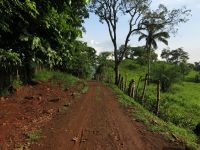Join us for an engaging discussion around the economic benefits of restoring productivity to deforested and degraded lands in Latin America and the Caribbean.
Latin America and the Caribbean account for over 20 percent of the world’s degraded lands, with 300 million hectares of degraded forests and 350 million hectares now classified as deforested—an area almost double the size of Mexico. WRI research shows an effort to restore Latin America and the Caribbean’s degraded forests, savannas, and agricultural landscapes would result in substantial net economic benefits.
Join us for an engaging discussion around the economic benefits of restoring productivity to deforested and degraded lands in the region. A panel of widely-respected experts in policy, science and economics will comment on WRI's new report, The Economic Argument for the Restoration of Degraded Lands in Latin America and the Caribbean, which puts a dollar value on some of the benefits provided by restoration across Latin America. This is especially relevant given Latin American national commitments to begin restoration across more than 20 million hectares—an area larger than Uruguay— in the next few years through Initiative 20x20.
Featured Speakers
- Paulo Sotero, Director, Brazil Institute, Wilson Center
- Helen Mountford, Director of Economics, World Resources Institute
- Walter Vergara, Coordinator, Initiative 20x20 and Senior Fellow, World Resources Institute
- Luciana Gallardo Lomeli, Economist, Initiative 20x20, World Resources Institute
- Sean DeWitt, Director, Global Restoration Initiative, World Resources Institute
- Lester Brown, President and Founder, Earth Policy Institute
- Thomas Lovejoy, Senior Fellow, United Nations Foundation
- Paola Agostini, Global Lead for Resilient Landscapes and Lead Environmental Economist, World Bank


